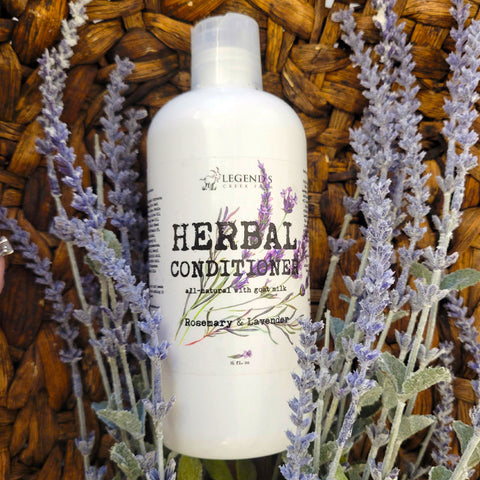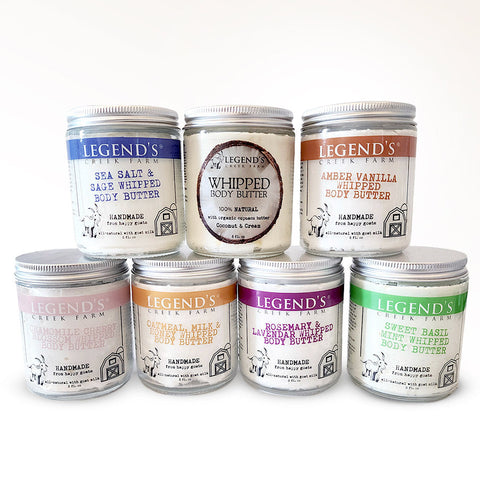Goat milk soap is not technically pH-balanced. That doesn’t mean it’s bad. In fact, it might be the best thing your skin ever touches, especially if you deal with eczema, rosacea, or dryness.
In this article, I’m pulling back the curtain on how soap pH actually works, what goat milk really does for your skin, and why our triple-milled bars feel so different (It’s not just the ingredients, it’s the process). Whether you're here out of curiosity, concern, or because your skin has been crying out for a change, I’ve got you covered.
Let’s dig into the facts, because your skin deserves clarity and care, not confusion.
What Is pH & Why Does It Matter for Your Skin?

Let’s get science-y for a second, but don’t worry, I’ll keep it real. If you’ve got skin that throws a tantrum when you change products (hi, rosacea warriors and eczema fighters), understanding pH isn’t just helpful, it’s empowering.
🛡️ Understanding Your Skin's Acid Mantle
Your skin has a built-in security system called the acid mantle, a super-thin, slightly acidic layer with a pH between 4.5 and 6.2. It’s like a natural forcefield that:
-
Keeps out bacteria and pollutants
-
Locks in moisture
-
Prevents irritation and flare-ups
When you strip it away with the wrong products, especially harsh cleansers or anything loaded with synthetic junk, it can take a hit. And that hit can mean inflammation, breakouts, or dry, itchy patches that don’t seem to go away.
That’s why people with sensitive or compromised skin (like those going through chemo or dealing with chronic skin issues) are hyper-aware of what goes on their skin. And rightfully so.
Where Do Most Soaps Fall on the pH Scale?
Here’s where things get interesting, and confusing. Not all cleansers play by the same rules.
-
Commercial soaps (the big-brand stuff) often land around pH 9–11. These are your standard drugstore bars, often super drying, even if they smell nice.
-
Syndet bars like Dove? These are synthetic detergent bars made to mimic the look of soap but fall around pH 5.5–7, making them technically “pH-balanced.” But they aren’t true soaps, and yes, there’s a difference.
-
Handmade goat milk soaps, like ours at Legend’s Creek Farm? These typically range between pH 5.5 to 6, even though the goat milk itself is more acidic.
Is Goat Milk Soap Really pH-Balanced? (And Why It Still Feels Gentle)
Let’s clear up one of the biggest misconceptions I see floating around in skincare circles: the idea that because goat milk has a lower pH, goat milk soap must be pH-balanced too.
I get the logic, but the reality? Not so simple.
Why Goat Milk Soap Feels Gentle Despite the pH
Goat milk isn’t in our soap just for show. It’s loaded with natural fats and proteins that do wonders for your skin, especially if you’re prone to dryness, flaking, or sensitivity.
-
The fatty acids in goat milk help seal in moisture, so your skin feels soft, not stripped. This makes a huge difference compared to other natural soaps that can feel tight or waxy after rinsing.
-
Lactic acid, a naturally occurring alpha hydroxy acid (AHA), offers gentle exfoliation. It helps remove dead skin cells, which can leave your skin smoother and brighter. That said, if you have ultra-sensitive skin (like during a rosacea flare), I always recommend starting with our unscented bars and doing a patch test.
-
Our soaps are cold-processed and triple-milled, meaning they go through extra curing time and water removal. The result? A bar that’s denser, silkier, and longer-lasting. You’re not just getting a gentler feel, you’re getting a bar that stays smooth and lathers beautifully over time.
Why Sensitive Skin Still Loves Goat Milk Soap
If you’ve got skin that throws a fit over anything new, I hear you, loud and clear. I’ve spent years working with customers who struggle with rosacea, eczema, chemo-related dryness, and mystery flares that seem to come out of nowhere. And one thing they all have in common? They’re tired of products that overpromise and underdeliver, especially when it comes to “natural” soaps.
Let’s get into what really matters when your skin is on the sensitive side.
Unique Benefits from Goat Milk
Goat milk isn’t just a marketing gimmick, it’s a skincare multitasker. It naturally contains:
-
Vitamins A, B6, B12, and E: These help with everything from collagen support to calming inflammation, promoting healing for skin that’s seen its share of irritation.
-
Caprylic acid: This fatty acid is a dream for quick absorption. It helps moisture sink in without leaving that greasy feeling behind.
-
Anti-inflammatory compounds: Perfect for taming redness, flare-ups, and dry patches from conditions like acne, psoriasis, or eczema.
This isn’t theory, I see it in the emails we get from customers who’ve finally found relief. From new moms with hormonal skin changes to cancer patients struggling with treatment-induced dryness, goat milk soap offers real comfort without compromise.
Comparing pH: Goat Milk Soap vs. Other Cleansers
At Legend’s Creek Farm, our goat milk soap is uniquely formulated to have a skin-friendly pH of 5.5–6, a rare feat for true soap. Here’s how it stacks up against other popular cleansing options:
|
Product Type |
Typical pH |
Notes |
|
Goat Milk Soap |
5.5–6 |
Matches skin’s natural pH; gently cleanses without disrupting acid mantle |
|
Syndet Bar (e.g., Dove) |
5.5–7 |
Closer to skin’s pH, but made with synthetic detergents |
|
Dr. Bronner’s Soap |
9–11 |
Castile-based; often drying or irritating for sensitive skin |
|
Plain Water |
7 |
Neutral but can still disturb skin pH temporarily |
This lower pH, paired with goat milk’s rich fats, vitamins, and proteins, is one reason our soap feels so gentle, soothing, and hydrating, even if your skin is easily irritated or pH-sensitive.
Let me know if you'd like to go back and revise earlier mentions of pH (like the above-the-fold summary or technical explanations) to match this accurate formulation.
Does Soap pH Really Matter?
Yes.I’ve had plenty of people message me saying they’ve avoided goat milk soap because they were told “only pH-balanced products are safe.” That’s not the full story.
Your skin is resilient.
Even if you wash with something that shifts your pH (like literally everything, including water), it usually rebounds to its natural acidic state in about 2–3 hours. That’s your acid mantle doing what it was designed to do, heal and protect.
So while pH is a factor, it’s not the only one that determines how your skin feels after cleansing.
Here’s what matters more:
-
The quality of your ingredients (we use real goat milk, not powdered or reconstituted)
-
The soapmaking method (ours is cold-processed and triple-milled)
-
And the extras like nourishing oils, creamy lather, and smart formulation
That’s what gives goat milk soap its silky, non-stripping feel, not just the pH number on a scale.
What to Look for in a Goat Milk Soap (Especially for Sensitive Skin)

If you’ve ever had a soap leave your skin red, flaky, or tight, and then been told, “It’s just purging” (ugh, don’t get me started), you know how hard it is to find the right bar. The kind that cleans without stripping. That soothes without stinging.
Here’s what I tell customers every day at Legend’s Creek Farm when they’re looking for something safe, nourishing, and actually effective:
Key Qualities to Look For
If your skin is sensitive, reactive, or just plain picky, keep your eyes peeled for these non-negotiables:
-
Cold-processed or triple-milled: Cold-processing preserves the natural fats, while triple-milling removes excess water, giving you a dense, creamy bar that lasts longer and hydrates better.
-
Minimal, natural ingredients: Look for a short list of things you recognize, like olive oil, coconut oil, and real goat milk. Skip the synthetic preservatives and filler.
-
Unscented or essential oil–based fragrance: Fragrance is a huge trigger for many people. Our unscented bars are customer favorites for a reason, but if you want a little scent, stick with mild essential oils (lavender, oatmeal & honey, etc.).
-
Ethically sourced goat milk: Not all milk is created equal. At Legend’s Creek, we use high-quality, cruelty-free goat milk, no powdered shortcuts.
-
Free from sulfates, parabens, alcohol: These common ingredients can be harsh, drying, and irritating, especially if you’ve got compromised skin. Better to skip them entirely.
Is Goat Milk Soap Good for pH Balance?
Here’s the real talk you won’t always hear from the skincare industry: goat milk soap isn’t technically pH-balanced, and that’s perfectly okay.
If you’re chasing a magic number, you might miss the bigger picture. Because what truly matters isn’t the pH stat on a chart, it’s how your skin feels after you use it.
Goat milk soap may have an alkaline pH, but with the right formulation, it delivers a luxuriously gentle clean. At Legend’s Creek Farm, our bars are cold-processed, triple-milled, and packed with natural fats and vitamins that help hydrate, calm, and nourish, even when your skin is feeling its most fragile.
I’ve seen it in customers navigating chemo, in moms battling postpartum sensitivity, and in folks like me who just want simple, soothing skin care that works.
So no, it’s not about a “perfect pH.” It’s about products that feel like they were made just for you.
Ready to Try Goat Milk Soap for Yourself?
Join the thousands of people who’ve made the switch, and felt the difference. Our Triple Milled Goat Milk Soaps are formulated to be everything your skin needs, and nothing it doesn’t.
From one sensitive skin friend to another: You’re going to love what you feel.





